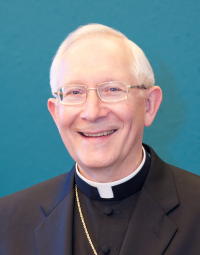
Archbishop Leonard P. Blair
THIS MONTH’S FEATURE STORY on the work of the Connecticut Catholic Conference highlights an important aspect of our engagement in the world as people of faith. According to the social teaching of the Church, responsible citizenship is a virtue and participation in the political process is a moral obligation.
Increasing numbers of Americans, including many Catholics, think that faith and religion have nothing to do with the political process, as if government were an a-religious, a-moral machine that simply monitors the economy and provides agencies like the FAA to make sure that airliners are safe. To the extent that our government turns into a machine, it will surely eat people up as many other governments have through history, and still do throughout the world today.
The fact is, religion and the moral and ethical teachings of religion have everything to do with our nation’s pursuit of the common good and authentic human progress. Individually and as a Church, we have a responsibility to bring a moral voice and conscience to the public square. Participation in the political process, in the words of the U.S. Bishops, “… bring[s together the guidance of the Gospel and the opportunities of our democracy to shape a society more respectful of human life and dignity, and more committed to justice and peace.”
I still remember a newspaper cartoon that appeared during President Clinton’s legal woes in the 1990s. The cartoon was based on the Old Testament episode of the people’s infidelity to God at the foot of Mount Sinai when Moses took so long coming down. The cartoon shows a startled Moses, holding the Ten Commandments and looking at the people running riot below him. A voice shouts out from the crowd, “It’s the economy, stupid.”
For a person whose conscience is formed by Catholic faith and morals, a country cannot be measured by material wellbeing alone, important as that is. There is also moral and spiritual well-being, which, if undermined, will surely destroy material well-being too. What Jesus asks of individuals can also be applied to a whole nation: “What does it profit you to gain the whole world if you lose your soul in the process?”
Our voice and our vote ought to reflect our faith. To be a Catholic is to believe objective truth exists, including moral truth, and that it can be known by faith and reason. In the words of Pope St. John Paul: “… an alliance between democracy and ethical relativism … would remove any sure moral reference point from political and social life, and on a deeper level make the acknowledgement of truth impossible. Indeed, ‘if there is no ultimate truth to guide and direct political activity, then ideas and convictions can be easily manipulated for reasons of power. As history demonstrates, a democracy without values easily turns into open or thinly disguised totalitarianism.’” (Veritatis Splendor, no. 101)
The effectiveness of the Connecticut Catholic Conference relies on an important, and sometimes neglected, aspect of Church life, namely, that “it belongs to the laity to seek the kingdom of God by engaging in temporal affairs and directing them according to God’s will … permeating social, political and economic realities with the demands of Christian doctrine and life.” (Catechism of the Catholic Church, no. 898f)
Undoubtedly, there are many fine practicing Catholics in all walks of American life, including politics, but it must also be acknowledged with sadness that things are not what they should be. Some admit to a lack the conviction or courage to stand up and be counted. Still others claim to be Catholic, yet pick and choose when it comes to the actual content of Catholic faith and morals. I invite all of us to rise to the moral and ethical challenges of our day and, formed by our Catholic faith, to “speak the truth with love” in the public square and the halls of government in dialogue with all people of goodwill.
